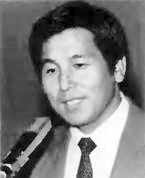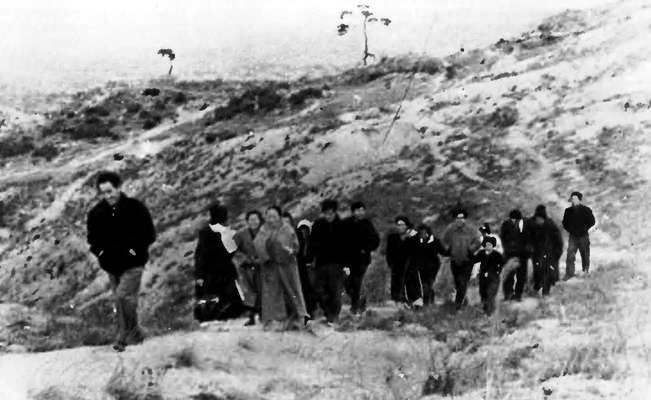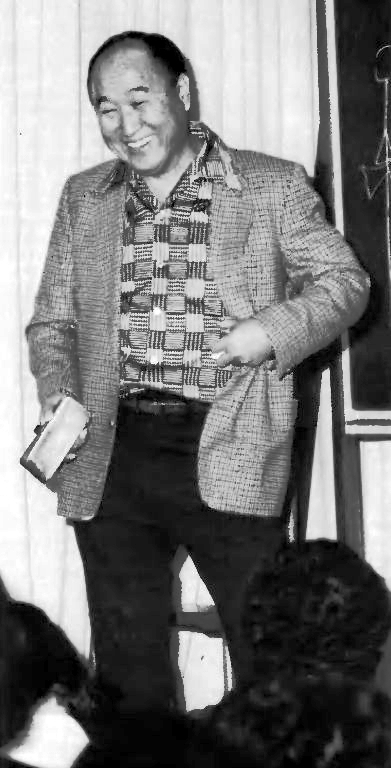![]()
The Words of the Kim Family Before 2008
|
|
The Words of the Kim Family Before 2008 |

Rev.
Byung Ho Kim
When Father visited us from Danbury in January, he gave an explanation of the history of the Unification Church. In private meetings, he drew an analogy between the present and the time when Moses was about to leave Midian to return to Egypt. He spoke of how, through Miriam and Aaron, Moses contacted the elders of the Israelites to inform them of the coming exodus. Similarly, he said, we must now notify the leaders of Christianity of the imminent departure to Canaan.
In building a house, the foundation is always put in first. There is not much to see in the foundation of a house. Yet from this foundation, with additional hard work, the house is erected. This is the process of God's work in history.
In both Moses' time and our own, God has worked hard to establish the foundation for the departure to Canaan -- or the land of God. The cornerstone of this foundation is that the people accept God's appointed one as their leader.
Between 1905 and 1945 Korea was under Japanese domination. The Korean people were powerless under the yoke of Japan. In such situations, people begin to look for some miraculous deliverance. The people longed for some leader who could liberate them, and they became more religious during this time. Although the Korean people yearned for independence, they did not anticipate that their freedom would come soon. However, because of the victory of America and the Allies, predominantly Christian nations, in the Second World War, Korea was suddenly emancipated.
Between 1945 and 1948 Korea came under the administration of the American army, which was to protect the newly independent country until it had a stable government. During the Japanese occupation there had been a temporary Korean government in exile in China, but this was not yet truly prepared to launch a viable government in Korea. The American government understood the need for Korea to be protected in its early reconstruction efforts and so instituted three years of military control.
Because Korea had been liberated by predominantly Christian nations, and was temporarily under the benevolent protection of America, Christianity and the influence of the West grew very quickly. Almost all of the Korean heroes were Christian. Some had fought for Korean independence for many years; others had fought in the war alongside the Americans. One such hero was Syngman Rhee.
Messianic expectations were strong and prevalent. The Korean people were awaiting powerful events, stemming from the new tide of Christianity, or from the God of old in whom the Korean people traditionally believed.
Their situation paralleled that of the Israelite people in the time of Moses. The Israelite people were praying for the Messiah, a special and powerful man, to come forth. They felt that without miracles from God, there could be no hope. Heavenly Father was able to create this atmosphere of anticipation among the Israelites on the foundation of 400 years of sacrificial history under Egyptian domination. It was in the midst of this kind of fervor that God decided to send Moses. He told Moses: your people have suffered enough; please go to them now and guide them to Canaan.
The very same kind of intense feeling permeated Korea during the Japanese occupation. The Korean people really had no clear idea of how they would gain substantial power or be delivered from their suffering; they just had faith.
When Moses was born, the pharaoh determined to kill all the male Hebrew children in hi, empire. Threatened with having to give up her son, Moses' mother must have felt great hatred toward the Egyptians. That kind of spirit can be passed on to the child. So already from within his mother's womb, Moses inherited a strong resentment against the Egyptians.
Moses' mother was able to get into the palace as a nurse for her son. Thus Moses could be educated by his own mother within the palace walls. I'm sure that Moses' mother would continually remind her son, "You are not Egyptian. You are one of the chosen people of Israel. Remember how your people are suffering. Remember it." She would guide him this way. So he became very nationalistic; and when this resentment came out, he couldn't control himself.
Growing up in the pharaoh's palace, however, Moses was also educated in all the Egyptian culture and technology. It is very interesting to see how God raised Moses so that he had the spirit and faith of Israel, but the external knowledge and power of the Egyptians. Moses could stand between the two cultures and digest both. Perhaps God would not have been able to work if Moses had been purely a resentful and nationalistic Israelite with no foundation of knowledge or power; nor would He have been able to work if Moses had come to be purely Egyptian in his thinking. God was able to raise Moses in such a way that he could be proud and strong in his Israelite faith and spirit, and at the same time, erudite and outgoing within the Egyptian realm.
While the Israelites nurtured their messianic hopes, the pharaoh and the Egyptians were trying, even ruthlessly, to suppress them. It was in this kind of atmosphere that God called upon Moses to contact the Israelite people.

After
1945 Father had to commence a course similar to that of Moses in
Midian. Here he walks with early disciples in the Korean mountains.
Having grown up in the palace, Moses was not very involved with the common people. God wanted Moses to connect personally with the Israelite people. His primary plan was for Moses to be accepted as their leader, and for him to work to bring them into unity.
So God set up a providential situation. One day after Moses had killed the Egyptian, he went out and saw two Israelite men fighting. They might have been ordinary men, but more than likely, they were important men who had influence over the Israelite people. Moses interrupted them and urged them not to fight. I think that he was trying to convey to them: we are under Egyptian domination; rather than fighting against each other we should unite and work together.
However, the men did not listen. They said to him, "Who made you a prince and judge over us?" God's primary plan didn't work, and the forty-year foundation of raising Moses in the palace was almost totally destroyed. In reading this history we might wonder who was at fault: God, the Israelites, or Satan. Even Moses himself might have wondered why God had not set up a more perfect situation in which the people could not deny that he was to be their providential leader; he might have felt that God had not made a good enough preparation.
In truth, the providential connection failed because of Satan. This world is under Satanic rule. Bit by bit, God is always trying to take dominion away from Satan. He often has to work in secret, like the underground resistance; He cannot just declare openly to his enemy that He is about to attack. He tries to create a minimum foundation in a secret way, and if there is even a five-percent possibility of success, God will invest his 95-percent responsibility when people lay that foundation. This is why God is always in an insecure position. For example, in the time of Noah no one, not even Satan, believed that God would deliver a flood judgment. Noah and his family quietly made the condition of faith and offered themselves sacrificially. Because this one family succeeded in erecting the minimum foundation, God could render judgment and the rain began.
In a way similar to the time of Moses, Heavenly Father prepared Korea for forty years under Japanese domination. Father was born in Korea, but he went to Japan and learned their technology and learned about leadership. Like Moses, his internal and external inheritance straddled two different cultures; and like Moses, Father was also strongly nationalistic and fought for the independence of his people.
During this time the Japanese attempted to enslave the Korean people culturally by forcing them to bow down to the female goddess of the Shinto religion before engaging in Christian worship. The Christian people could not accept this. For 4,000 years Judeo-Christianity had worked to destroy idols, and did not allow anyone to bow down to any false god. Many rebelled against the Japanese mandate.
In these historical circumstances Heavenly Father prepared the atmosphere of messianic expectation among the Koreans just as He had among the Israelites. The Korean people hoped for deliverance at the hands of the Western Christian countries, and the emergence of a messianic leader who would help them.
Father grew up in this atmosphere of oppression and messianic expectation. He became a very strong Christian. Finally, having gained a profound understanding of God's will, Father expected a way to make providential contact with the Korean people. So he approached a prepared Christian group. The people of this group opposed Japan; they were nationalistic but also deeply concerned with God's will, and they maintained a strong spirit. If they had united closely with Father, they would have become the center of Korean Christianity and national heroes. Unfortunately, as with Moses, this plan did not work.
What happened with Moses? One day he saw an Egyptian persecuting an Israelite; he got angry, and actually killed the Egyptian. He was compelled to flee to Midian. So Moses, whom God raised up to lead the Israelites, was no longer among his people.
Moses stayed in Midian for forty years, praying and preparing to bring the people out of Egypt and into Canaan. Prayer was probably not his only preparation. Don't you think it's likely that Moses actually researched the nature of the Midian wilderness, the character of the Israelite people and the culture of Egyptians, and that he attempted to formulate a realistic plan to accomplish the exodus? God had to guide Moses concretely to become the leader of Israel.
After forty years, God directed Moses to go back to Egypt and bring forth the Israelites. Moses was already quite a substantial and practical man, and he had already had one experience that didn't work. So he argued that he could not convince the Israelites, but God insisted it could be done. Moses objected because he was a poor speaker, but God had prepared Aaron and Miriam and offered them to Moses for the mission. Moses objected that the people might once again disobey, but God said He would be with Moses and that he should have faith. And God promised to work miracles.

Father
explains his 40-year course in a leader's conference at Belvedere on
January 4, 1985.
When Moses returned to Egypt, there was still a foundation there. The people were still hoping for a deliverer -- not the Messiah himself, necessarily -- but a capable man who could lead them out from under Egyptian domination. The leaders of the twelve tribes probably saw that Moses had that potential.
Similarly in Korea, many people are saying that they don't necessarily believe that Father is the Messiah, but they perceive his potential and believe that he may be able to give important guidance to their country.
Although there is no account in the Bible, it is likely that Moses got together with the leaders of Israel once again through Aaron and Miriam before approaching the pharaoh. How was Moses able to stand before the pharaoh and tell him to let the Israelite people go? Moses knew the pharaoh, the palace, the Egyptian character. Moses also knew the heart of the Israelite people and was connected to their destiny as their leader.
Then the news of the awesome miracles performed by Moses spread among the Israelites. The people grew excited as their hope was confirmed. They decided to follow Moses.
God instructed Moses to tell the Israelite people to put the blood of the lamb upon their doorposts. Then during the night God smote all of the first-born sons among the Egyptians, but spared the Israelites. So when Moses instructed the people to rise up and leave Egypt, all 600,000 men and their families followed. Without notifying the people, no exodus could have taken place.
For forty years Father has been preparing a new worldwide foundation. That does not mean that Unification Church is itself the second Israel, or that Christianity is a failure. Christianity is not a failure yet. Father has worked hard in America because God cannot give up Christianity, no matter how much it has rejected him in the past. That is why we have always lent all our power to work with Christians ever since our movement began. So we can say that the Unification Church and Christianity must become one; united together we make the foundation for the second Israel.
If Christianity makes a mistake this time, it will really be a big problem. After 1945 Christianity remained on the Cain side, instead of repenting and taking responsibility. We were in Abel's situation, or the situation of Jacob with Esau. We tried to serve Christians but they always got upset and persecuted us. Yet Father never gave up. We as members continued to work, and Father also continued paying indemnity and making sacrifices for Christianity; through this, we can become one.
When the top Korean ministers came to see Father, Father told our leaders that no matter how much they persecuted the Unification Church, they did it because they thought it was God's will. Father said that they were not enemies to him, because they had served God and worked hard for the sake of God's will. He instructed the leaders to serve the ministers as their own parents and elders, and be more filial than the ministers' own sons and daughters. So we strove to carry this out.
If everything in the providence depended on the events of 1945 alone, then there would have been no further hope for the Christians; a terrible situation would have ensued for them. But in Father's mind, Christianity was never a failure, and he never cut the relationship. Because of that, Cain and Abel, Jacob and Esau can still be one. Even though Father saw that it was declining, he still put all his heart and energy into working with American Christianity. Recently he said that when he thought about what America had done to him, he could have strong resentment -- but now that many ministers are coming to support him and stand side by side with him, he does not have resentment. He wants to stay here and continue working with the American Christians.
It is now 1985. Forty years ago in Korea, Father tried to approach and work with Christianity there, just as Moses had tried to work with the Israelite people. It didn't work. Moses went to Midian and returned forty years later. Now it seems that we are in the same circumstances. We have come a full circle of forty years, to return to work with Christians once again.
Now everything depends upon our work. Father is sending us out as Aaron and Miriam to make the ministers positive. We must speak to them about the revival of Christianity, about religious freedom and about the CAUSA movement. We can prove that Father is the man who has the potential to restore Christianity as the real second Israel.
By reeducating Christians and working together with them, we can build a true foundation of substance. It is up to Christianity to save this country. America was founded by Christians, and now that that spirit is declining, it has to be brought back. So we must try to make a patriotic campaign with the ministers to save this country through the Christian spirit. Then together, as the second Israel, we must leave Egypt -- the satanic culture of faithlessness and corrupted morals -- behind us forever.
The next step is home church, where we must work to build Canaan together with sacrificial love. When the Israelites first got to Canaan, do you think they could right away enjoy riches and beautiful homes and fine food? No, the Israelites first had to destroy the idols and then create a new culture. Similarly, we must cut away our degraded culture and build a new heavenly culture centered upon God and directed by the Christian spirit. So where is Canaan? Canaan is in home church.
Unless the Christians understand the meaning of Canaan, they will not follow you. Therefore you must introduce them to Unification ideas and help them to recognize Father's potential as a leader. This is the time to leave Egypt; we must notify Christianity as the second Israel -- otherwise there can be no exodus.